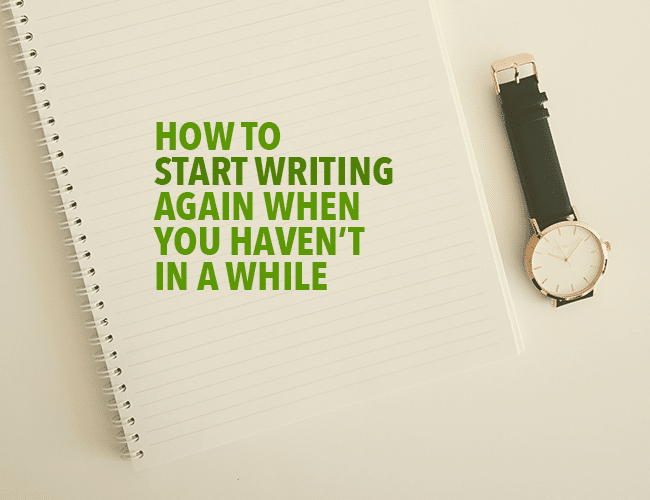If you've taken some time off from writing, whether that be a week or a year, we've got some tips to help you get writing again!

There are so many reasons to NOT write.
Life happens. There are new jobs, new babies, new houses. There's an increased workload at work, a major house project, a mental block.
There are a ton of things that might get you out of your writing groove. It happens to the best of us.
Here are 4 things to do when you start writing again.
If this has happened to you, no matter how long you haven't written, here are some tips to help you start writing again:
1. Don't beat yourself up.
Honestly, this is probably the most important tip I can give you. I mentor a lot of people at The Write Practice, and I can tell you this is the biggest problem for most people when they're trying to get their writing groove back.
Why? They feel bad because they haven't written. And then they don't feel like writing because they feel bad. And then they feel even worse for not having written.
It's a neverending cycle of guilt. Stop it. You didn't write for a while. So what? That's in the past. There's nothing you can do about it now. I don't even care if you had a “good” or a “bad” reason to not write. Don't make an excuse, make a plan.
2. Figure out what happened.
You might be able to pinpoint exactly why you quit writing. The top reasons I hear are moving to a new house, having work hours increased, and having a new baby.
That's all right. But doesn't it go deeper than that?
Life isn't going to stop happening, and if you're really serious about writing, you can't let every change be a reason for you to quit until you feel like picking up the pen again.
Here's a secret: there will never be a perfect time to write. (Kind of like the old saying that there's never a perfect time to have a baby, right?)
A major life change may have been the initial reason you took that first day off. But really, you're looking at a time management issue.
You maybe didn't “feel inspired” for a long time. That's not an issue with inspiration; that's an issue with discipline. (Seriously, if you wait to feel “inspired” you'll never write.)
Or maybe you had a cutting rejection or a terrible review which turned you off of the whole process. I feel for you there. I really do. But that's a determination issue, not the fault of the person who left those nasty words for your story.
And here's my favorite: fear. This is the one I struggle with the most. I have a book coming out in less than a month. I got the publication offer for it last year, and I kept putting off doing final edits because the idea of people reading the book was terrifying. What would they think of my little story? Ah, the horror!
I ended up taking our 100 Day Book program to finish the edits. And now the book is ready to go! And you know what was awesome? I did a cover reveal this week and the support and excitement I got from my readers, friends, and family was astounding. No need to be scared when I've got those people behind me!
Figure out the real reason you haven't been writing and fix it.
3. Realize your writing will probably suck.
Every writer out there will tell you writing is like working a muscle. If you get lazy for a period of time, you're not as good when you try to use it.
You're going to be rusty. You're going to hate everything you put on the paper. It's not going to match what's in your head. There might be tears.
The first few things you write are not going to win awards. Get that out of your head. That's not the purpose of those first new writings. Their purpose is to get you moving again. At this stage, if you just can't get a story to come together and you hate it, pitch it. That's perfectly fine.
This stage is like weightlifting. If you used to be able to bench 200 pounds but haven't touched a barbell in six months, you're going to have to drop that weight and work your way back up. It is what it is. Revisit my first tip if this makes you upset.
If you can't think of what to write (and you probably won't because your brain has forgotten how to recognize a story idea) find some prompts online. You can find them just about anywhere, including right here on The Write Practice, and if you don't feel like Googling, you can sign up for our newsletter or follow us on Instagram or Facebook and we'll give you more than you can handle.
4. Join a writing something.
You're going to feel so much better about starting up again if you have some support. Join a writing group on social media, or give our community a try. Take a writing class. Join a few author mailing lists (a great way to support authors, by the way), get some books on writing, follow sites that give writing prompts, or attend a handful of free writing webinars.
Any of this will help. You need to see other writers. You need to “talk writing” with people who get it. You need to dive back in to start writing again. Don't stick your toe back in. Dive.
Get back into writing!
There's nothing harder than trying to get back into doing something. This is why dieting and exercising are so tough for so many people. Writing is the same.
“Falling off the writing wagon” happens to every writer at some point. You just have to know how to get back on and have the determination to do so. You're serious about this writing thing, right?
Then do it.
Have you “fallen off the writing wagon”? How did you start writing again? Let me know in the comments.
PRACTICE
Today's practice is an oldie, but a goodie. I want you to close your eyes and imagine where your writing career will be at the end of 2021. Have you written a book? Have you published a book? Are you wicked famous and your bestselling series is getting the film treatment?
When you open your eyes, write for fifteen minutes about how Future You is doing with writing and how that feels.
Post your writing in the practice form below so you can get some feedback! And don't forget to leave feedback on your fellow writers' work!
Sarah Gribble is the author of dozens of short stories that explore uncomfortable situations, basic fears, and the general awe and fascination of the unknown. She just released Surviving Death, her first novel, and is currently working on her next book.
Follow her on Instagram or join her email list for free scares.




0 Comments